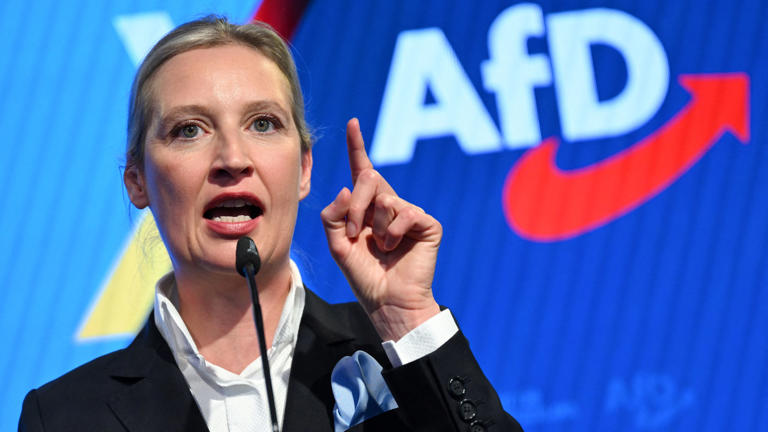“Germany’s Far-Right AfD Wins Big, But Faces Major Roadblocks!”
Germany’s national elections delivered a stunning yet long-predicted outcome: the far-right Alternative for Germany (AfD) has surged to become the second-largest party in the Bundestag, marking the strongest showing by a far-right party since before World War II. This seismic shift underscores a broader trend across Europe, where once-marginalized far-right parties have gained mainstream traction, fueled by public discontent over migration, cultural identity, and economic uncertainty.
Despite its success, the AfD remains locked out of national governance due to a strong political “firewall” upheld by Germany’s major parties, all of which have vowed to keep it from power. Still, Sunday’s results suggest the AfD is set to dominate the opposition, doubling its vote share from 2021 to around 20%. The party now trails only the center-right Christian Democrats (CDU) under Friedrich Merz, surpassing Chancellor Olaf Scholz’s center-left Social Democrats (SPD).
Merz faces a challenging path to forming a ruling coalition, further complicated by the AfD’s rising influence. AfD co-leader Alice Weidel celebrated the party’s gains, warning that any coalition Merz assembles with the SPD or Greens would be “unstable” and short-lived. She also ridiculed the CDU for attempting to mimic the AfD’s hard-right policies.
High voter turnout reflected deep frustrations over Germany’s sluggish economy and uncertain global standing. The outgoing “traffic light” coalition—comprising the SPD, Greens, and neoliberal Free Democrats—crumbled under internal conflicts, with all three parties suffering major losses. While a renewed “grand coalition” between the CDU and SPD appears to be the most likely governing solution, it risks alienating many Germans, particularly young voters, who flocked to the far-right and far-left in search of alternatives.
Germany’s Political Turmoil Fuels AfD’s Rise, But Challenges Loom
As Germany grapples with the fallout of its national elections, analysts warn that an unstable establishment coalition could further energize the far-right Alternative for Germany (AfD). Jessica Berlin, a senior fellow at the Center for European Policy Analysis, cautioned that a weak “grand coalition” could add “fuel to the fire of the AfD’s populism,” but saw little indication that bold leadership would emerge to counter it.
The next government faces mounting pressure to address urgent issues, including economic stagnation, crumbling infrastructure, and Germany’s evolving role in global affairs. Migration dominated much of the campaign, with the AfD capitalizing on fears by pushing for the mass deportation of Muslim immigrants and asylum seekers.
Despite its electoral gains, the AfD remains controversial. Some of its branches have been labeled extremist due to links with neo-fascist activism, and several party leaders have been accused of using Nazi-era rhetoric. Josef Schuster, head of the Central Council of Jews in Germany, condemned the party’s growing influence, calling it a disturbing sign that “a fifth of German voters” backed a party with ties to right-wing extremism.
The election also revealed widespread dissatisfaction with traditional parties. Exit polls showed only 12% of German workers supported the center-left Social Democrats (SPD), historically the country’s labor party, while up to 40% of workers may have voted for the AfD. The party has framed establishment politicians as traitors to national interests, a strategy echoing populist movements in the U.S. and elsewhere.
But the AfD isn’t the only anti-establishment force on the rise. A surprise surge by Germany’s hard-left party—rooted partly in the former East German Communist Party—highlighted broader voter discontent. Analyst Jeremy Cliffe of the European Council on Foreign Relations argued that the AfD’s rise is less about its own appeal and more about the failures of the outgoing coalition, adding that it remains “extreme even by European far-right standards” and lacks the polish of figures like Italy’s Giorgia Meloni.
The AfD’s momentum has attracted international attention. U.S. billionaire Elon Musk openly backed the party ahead of the election, while Republican Senator JD Vance snubbed Chancellor Olaf Scholz but met with AfD co-leader Alice Weidel in Munich—signaling ideological alignment. However, German leaders from across the political spectrum have expressed concern over what they see as unwelcome U.S. interference.
As election results solidified, Donald Trump praised the outcome, calling it a “great day for Germany” and likening it to his own anticipated victory in November. However, CDU leader Friedrich Merz distanced himself from U.S. influence, condemning Trump’s recent comments and asserting that “this American government doesn’t care for Europe.”
With Germany’s political landscape now deeply fractured, the challenge ahead will be forming a stable government—while containing the AfD’s growing influence.
